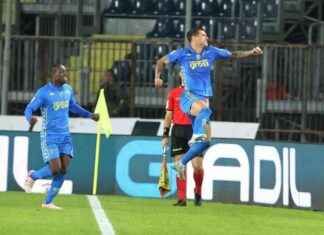This is doubly painful: Olympic champion Felix Loch cannot prevent the dominance of the Austrian lugers at the World Cup opener in Innsbruck – and even falls. His old mentor Georg Hackl, on the other hand, celebrates a furious debut with his archrival.
Abandoned by luck and by his mentor Georg Hackl, Felix Loch crouched in the ice gully of Innsbruck – it was an image with great symbolic power at the start of the World Cup for lugers in Austria. The home game was the greatest possible triumph for the hosts, with all victories in the main competitions going to Hackl’s new sporting home. Germany, on the other hand, was beaten, most notably among the men: Loch fell heavily and ended up 15th.
Was all this the Hackl effect? The “defector” himself did not want to overstate the result. “It was just a home World Cup to start with, which went well and happily,” said Hackl on ARD: “But that’s also very surprising for me. I knew that we had top people in every discipline, but that it I didn’t expect it to work in this power density.”
Because whether for men, women or in both doubles categories – the victory always went to Austria. It became particularly clear on Sunday. Loch was already hopelessly behind after the first run in sixth place, in the end Nico Gleirscher won ahead of his compatriots Wolfgang Kindl, Jonas Müller and David Gleirscher. Best German: World Cup debutant Timon Grancagnolo in seventh.
Loch looked battered after his fall, but left the ice channel on his own. “Of course you suffer,” said Hackl, “Felix is ??a good friend.” Hackl was a mentor as a coach, especially for the former dominator, and then surprisingly changed sides last May. Now he is supposed to help Austria to “pass the tobogganing superpower Germany and become number one”, says Markus Prock, President of the Austrian Association. The start was promising for some – and scary for others. However, it must be restricted.
Innsbruck was a home game, the Austrians traditionally look good here, even if they are rarely that strong. In addition, the material is being developed over the long term, Hackl’s influence is likely to be quite superficial at the start of winter. In any case, it is a clear warning signal for Loch and colleagues. At the upcoming overseas World Cups in Whistler, Canada, and on the US track in Park City, neither team has a fundamental advantage, there should be a clearer performance profile here. The Germans won’t be on their home tracks until late this winter: the World Championships will take place in Oberhof at the end of January, followed by a World Cup in Altenberg and two of them in Winterberg.






